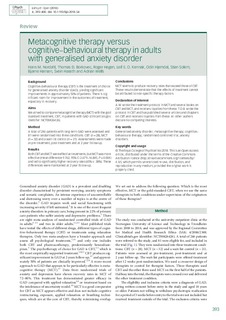Metacognitive therapy versus cognitive–behavioural therapy in adults with generalised anxiety disorder
Nordahl, Hans Morten; Borkovec, Thomas D; Hagen, Roger; Kennair, Leif Edward Ottesen; Hjemdal, Odin; Solem, Stian; Hansen, Bjarne; Haseth, Svein; Wells, Adrian
Journal article, Peer reviewed
Published version
Permanent lenke
http://hdl.handle.net/11250/2578858Utgivelsesdato
2018Metadata
Vis full innførselSamlinger
- Institutt for psykisk helse [1301]
- Institutt for psykologi [3103]
- Publikasjoner fra CRIStin - NTNU [38127]
Sammendrag
Background
Cognitive–behavioural therapy (CBT) is the treatment of choice for generalised anxiety disorder (GAD), yielding significant improvements in approximately 50% of patients. There is significant room for improvement in the outcomes of treatment, especially in recovery.
Aims
We aimed to compare metacognitive therapy (MCT) with the gold standard treatment, CBT, in patients with GAD (clinicaltrials.gov identifier: NCT00426426).
Method
A total of 246 patients with long-term GAD were assessed and 81 were randomised into three conditions: CBT (n = 28), MCT (n = 32) and a wait-list control (n = 21). Assessments were made at pre-treatment, post-treatment and at 2 year follow-up.
Results
Both CBT and MCT were effective treatments, but MCT was more effective (mean difference 9.762, 95% CI 2.679–16.845, P = 0.004) and led to significantly higher recovery rates (65% v. 38%). These differences were maintained at 2 year follow-up.
Conclusions
MCT seems to produce recovery rates that exceed those of CBT. These results demonstrate that the effects of treatment cannot be attributed to non-specific therapy factors.

